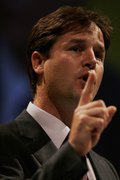 I spent the morning at the LSE, listening to Nick Clegg’s first big speech at Lib Dem leader and then participating in a panel on the issues he had raised. After a scrappy campaign, this was Clegg back to his formidable best. All comparisons with Blair’s Clause Four moment are flawed in one way or another, but this was certainly the moment when the new leader made clear to his party that he intends to take them on and to shake up some of their laziest preconceptions.
I spent the morning at the LSE, listening to Nick Clegg’s first big speech at Lib Dem leader and then participating in a panel on the issues he had raised. After a scrappy campaign, this was Clegg back to his formidable best. All comparisons with Blair’s Clause Four moment are flawed in one way or another, but this was certainly the moment when the new leader made clear to his party that he intends to take them on and to shake up some of their laziest preconceptions.
Try this for size: The last ten years has shown that money isn’t everything. The big questions now are these: how do we make Britain a fairer place without raising the overall tax burden? How do we promote real social mobility without relying on the discredited politics of Big Government? In seeking to make Britain fairer, we need to stop just asking “how much”, and to start thinking hard about “how”. The first step is to scale back the vast monster of Whitehall. Whitehall should get out of the business of the day to day running of public services in Britain. That strategy doesn’t work. We will draw up plans for radically shrinking the size of all our public service departments – to re-focus them on setting broad objectives for the local agencies and people who deliver on the ground. I didn’t come into politics just to transfer power from a set of national politicians to a set of local politicians. That’s a necessary first step, but it is not an end in itself. We need to empower people who use and people who deliver public services every day. We know central government gets in the way of that happening. But let’s not pretend that local government is blameless. Councils too can impose bureaucracy, insist on unnecessary control.
Or this:
And here is Clegg on devolution:
Remember this is a Lib Dem talking: no overall rise in the tax burden, smaller Whitehall departments, devolution to the citizen rather than just to the town halls that Lib Dems love so much. Some in his party will urge Mr Clegg to tack Left and go for Old Labour votes. I think he is spot on in trying to make his party the authentic voice of public service reform, committed to the real priorities of the 21st Century electorate and the challenge of linking our expectations as consumers with our role as citizens. It is much too early to say whether he will persuade his own party, let alone the public. But this was an impressive and robust beginning.






Comments